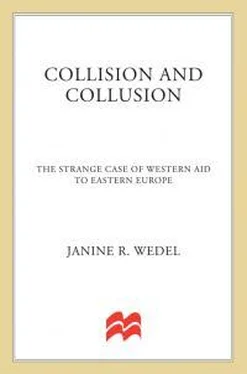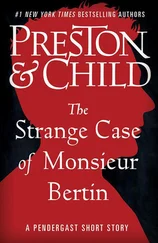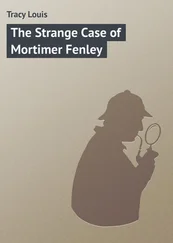Recipients often perceived the consultants as arrogant, which appears to have helped them foster, in some cases, a defensive national pride. Polish minister Jacek Saryusz-Wolski, responsible for aid coordination, said in 1992 that the West’s approach to assistance was “paternalistic, like a parent giv[ing] to a child.”40 One could see why such an approach offended a people whose culture and civilization were centuries old and whose educational systems typically upheld high standards.
Further, although the Marriott Brigade consultants may not have always understood important parts of their job, they did understand perks. At least that is how they appeared to their hosts in the early days of the aid effort. In contrast to their local counterparts, the Western consultants were treated well, with lush living quarters, housekeepers, and drivers. Some made exorbitant salaries (although not necessarily by Western standards). As Czech aid official Pavel Rozsypal wrote in 1994:
The salaries paid to foreign assistance contractors advising government ministries are widely known by Czech officials to be stratospheric in local economic terms—it is known, for example, that EU PHARE advisers are paid six times more (and upwards) than the ministers they are paid to assist. This of course causes a certain level of cynicism on the part of the local beneficiaries regarding just who is the intended beneficiary of foreign assistance; criticisms in this regard are widely circulated in Czech government offices.41
Although one could not have expected foreign consultants to be paid according to local standards, one might have hoped they would accommodate more to those standards as guests abroad. The consultants’ conduct was perceived to be ostentatious and was especially off-putting to the unassuming, modest, and (if only initially) deferential local officials. While ostensibly trying to interact with their hosts in a productive way, some consultants tended to make the disparities even more evident by indulging in material excesses while they were in town that perhaps they couldn’t afford at home. Local lore created a caricature of consultants that went something like this: Consultants visit Warsaw and are chauffeured around town by day to meet with a series of officials. At night, they frequent the best restaurants and then return to the marble columns, ornate chandeliers, and spacious lounges of the five-star Marriott, where they meet other foreigners for a drink. Usually in town only for a few days, their next stop is Prague or Budapest for further consulting, or Rome or Paris for vacation.
At least for a time, communist-style reactions seemed to live in the bones: As under communism, many complaints during the Disillusionment phase were made under the breath, while appearances were maintained in public venues. And, like the symbolic protests of oppositionists under communism, there was often much more talk than action. But over time, many host officials felt increasingly put upon and began to see little personal or professional benefit from encountering foreigners. Scenes from the Triumphalist phase, in which Eastern officials put on communist-style shows for Western visitors and in which the working understanding was “You pretend to help us, and we pretend to be helped,” diminished.
By January 1992, a chorus of Polish and Hungarian officials (whose countries at that point had received the most aid) had concluded that their countries were “technically overassisted” in most areas, as Marek Kozak, a Polish official who monitored foreign aid, put it, and that the assistance was doing more harm than good. Overburdened top-level officials, often working without benefit of trained support staff, complained that they couldn’t do their jobs because they had to spend so much time meeting with fact finders and consultants. Hungarian privatization official Péter Kazár called the state of affairs “ridiculous.”42 Kozak went so far as to suggest that the main benefit derived from the Marriott Brigade was not the expertise they provided, but the hard currency they contributed to the local economy.43 Another recipient aid official stated that “foreign advisers come here and tell us what to do.” He said that the technical assistance offered by the donors was designed to alleviate unemployment in the West.44 A Price Waterhouse consultant in Poland agreed: “At the end of the day, the funding sort of ends up in the pockets of the Western governments.… If you’re cynical … you could see it as a way for Western governments to pay money to Western professional firms like ours.”45
The same complaints heard in Central Europe circa 1991 and 1992 were echoed in Russia and Ukraine in strikingly similar language several years later. As Russian economist Leonid Abalkin wrote:
In all discussions with Russian representatives, as a rule, one can hear an opinion that the American technical aid is, by and large, directed toward satisfying the interests of Western consulting firms (creating jobs and large incomes for their employees).… It is more and more often mentioned by the Russian side that the Western consultants are ill-prepared for working in Russia, have poor knowledge of our economic, legal and psychological realities.46
And in Ukraine, because technical assistance was perceived to have gone awry, the Ministry of the Economy created a separate agency to analyze the source and destination of technical assistance and to advise the government on aid issues. According to Mykola Horkusha of the aid ministry, Ukrainian officials determined that “about 80 percent of this [technical assistance] goes for consultants.… During the 1993-1995 period we came to the conclusion that we don’t need more consultants.”47 According to Alexander Paskhaver, an adviser on economic policy, “Western consultants need to be here for at least three months to be effective. Between 1990 and 1993 a lot of consultants came in for short periods. It was absolutely useless and expensive.”48
A PARADISE FOR SPIES
If recipients found the advice and conduct of consultants less than ideal, another theme sometimes was voiced: that their presence and activities were suspect. Consultants who obtained access to sensitive materials, whose firms also explored business opportunities, or who worked closely with local officials perceived to be corrupt opened themselves up to such allegations.
But how the consultants were received in the host countries was not, at least initially, a question with which many donor agencies appeared to concern themselves. Donors and consultants, such as those working for the Big Six, found that they met each other’s needs: Aid provided by donors helped the Big Six to gain entry to the region, and the Big Six’s image of adherence to high standards of accountability and neutrality was expected to reflect positively on donors’ images.
According to donors, another advantage of hiring consultants from the Big Six accounting firms was that the latter had contacts with potential Western investors. In theory, the kind of technical assistance offered by the accounting firms should have helped to create the infrastructure necessary to attract foreign investment. Some in the aid community believed that those providing technical assistance should have helped, directly or indirectly, to match companies in the recipient countries with suitable foreign investors. Yet the link between technical assistance and investment was often missing; a disconnection diffused consultants’ activities at the enterprise level and activities that might have led to investment.
Further, Central and Eastern European officials frequently reported that little concrete investment activity followed from consultants’ reports. Even well-conceived consultants’ reports often had only the most tenuous links to the realities of implementation. The consultants’ recommendations often could not be implemented and, rightly or wrongly, went “directly into the trash,” as one ministry official put it. The Czech deputy minister of foreign affairs, Pavel Bratinka, reported an “overemphasis on studies and consulting work, the result of which is not immediate and in many cases doubtful.”49 Officials from the recipient Slovak privatization ministry hoped that one report, produced by a Big Six firm and funded by USAID, would provide “very concrete and tangible results” and help prepare the Slovak Republic for meeting World Bank requirements. Instead, the report turned out to be merely a “general description about the current state of privatization and some general targets.”50 As another privatization official lamented, “No enterprise wants to receive technical assistance without investment.… There were many studies without useful results because there were no investments [that resulted from them].”51
Читать дальше












